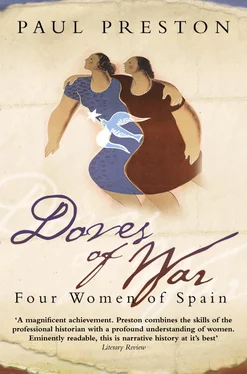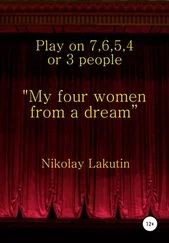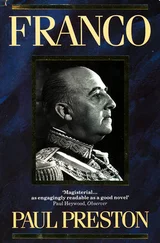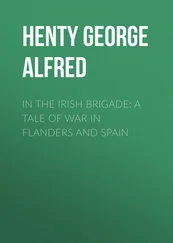It is fun to see newly taken big towns. Auxilio Social distributing bread from lorries, men sticking up anti-Red and up-with-Franco posters everywhere, people clearing up debris in the streets, putting down telephone wires, looking for houses for hospitals and offices, and dozens of simple sightseers. Unluckily the fun of a frantically pleased population waving flags and making whoopee was missing as all the Catalans are red so don’t look on us very much as heroic liberators. 111
Despite the comfort of travelling as Princess Bea’s companion, Pip made the courageous decision to join a unit of Franco’s Moroccan Army Corps. It meant risking the Infanta’s displeasure and giving up the possibility of frequent meetings with Ataúlfo, but ‘after all, I came here to work’. To her chagrin, Mercedes Milá would not permit her friend Consuelo to join the same unit. ‘God knows that I don’t want to go all alone to a new equipo miles from Princess Bea and her family where I know no one and there is no one who can speak a word of English or has anything even distantly to do with my previous life.’ Her decision was all the more plucky given her own war-weariness.
This time last year I was in Ventosilla wildly excited that at last I was off to the front. How much one year can wear out one’s enthusiasm and vitality. It seems at least five years since I left Ventosilla and God how sick I have got of the war in that time … if I have to spend another wartime Christmas here I shall die of depression and worries and illnesses … If only the war could be over so that I could stop worrying about Ataúlfo and go away somewhere and never move, speak or think for a month. I am tired out both morally and physically.
Her new unit was in the agreeable surroundings of the elegant resort of Sitges to the south of the Catalan capital. Billeted in a fashionable hotel, the sun and the beach cheered her as did the news that Barcelona had fallen on 26 January 1939. The prospect of being among the first to enter the city excited her and her morale was further bolstered by the fact that she was the most competent of the nurses in her new unit and was given plenty of responsibility. On 27 January she visited Barcelona with the rest of her unit.
It is a lovely big spacious town and quite unharmed though very dirty. We drove madly all round it. The port is a shambles due to the hard work of aviation. The streets were crowded with people showing considerable enthusiasm. Everyone shouting and cheering and all the girls parading up the streets with flags. The troops marching through were surrounded by cheering crowds and everyone was in splendid form. And yet as soon as one was out of the main streets, where all the fun was going on, the people looked surly.
To her disappointment, her unit was ordered to stay in Sitges as the Moroccan Army Corps was not participating in the rest of the advance. There, with astonishing energy, she singlehandedly created a functioning hospital out of the chaos of broken beds, tangled bed linen and boxes of utensils dumped by a convoy of lorries. There being little military activity she was able to drive to the Orléans house in Monzón and to marvel at Ataúlfo’s brand-new grey Condor Legion uniform. In Barcelona, she was regaled with horror stories of the Communist ‘ checas ’, the dungeons in which political prisoners were tortured and interrogated. Her hospital was moved to a lunatic asylum at San Baudillo de Llobregat and Pip was delighted to be in sole charge. In fact, the war was virtually over in Catalonia and there was talk of her unit being sent to Extremadura. 112
While awaiting orders, she spent her time ferrying the officers and nurses of her unit to and from Barcelona. Her description of a journey with one of the chaplains is worth repeating.
Matute is a dreadful bore and can’t see a car without getting into it. He always wants to go somewhere. We stopped in Vilanova i la Geltrú for petrol and my car was immediately surrounded by children as always. To my surprise, the priest, who had alighted leaps forward and starts to deal blows all around with his rolled-up newspaper. The little crowd dispersed in a moment. I was furious, as I thought it very unnecessary as they were doing no harm.
When the priest launched himself at the children a second time, Pip remonstrated with him. He skulked off while she entertained the children with a concert on her car radio. ‘They were sweet, all peering in through the windows and hushing each other and dancing and pretending to play the violin.’ On his return, he reaffirmed the marriage of Church and Francoist State by obliging the dumbfounded children to sing the Falangist hymn, ‘Cara al sol’ (face to the sun) and delivering a sermon on the meaning of its words. 113
The extent to which Pip had changed was illustrated on one of her frequent journeys. She had always been intrepid and was not fazed by hair-raising trips alone across mountain tracks in thick fog or through floods. The war had hardened her. On 16 February, she had an accident. Driving into Barcelona, intent on manoeuvring her car through convoys of lorries on narrow roads, she did not notice an old lady wandering into her path and could not brake in time. The woman was scared and bruised but otherwise unharmed. At one level, Pip was horrified but quickly recovered, commenting later, ‘I have gained an instantaneous cold-bloodedness in this war from having to show no feelings in my work when my insides are writhing. And ever since I was shelled at Escatrón I have a complete cold control over myself which is very useful.’ 114
Pip got her mother to send out 500 bedcovers, lots of white material, cloaks, boots together with some peach brandy and 10,000 cigarettes. She drove for twenty hours to Sanlúcar to spend her leave with Ataúlfo. She finally began to recover from the ravages of the war.
I live in a sort of peaceful haze of pleasure. The continual trouble of having to watch my step with Ataúlfo so as never to appear more than good friends when I really long to be close to him, to touch him and so on is amusing despite its unpleasantness and frustration. It is like a continual game. I let myself go as close to flirting as I dare but without ever going a step too far, not even by so much as a look. I don’t know how long I shall have the self-control and placidity to be able to go on like this but for the moment it hardly disturbs my happiness at all, rather adds a flavour to it if anything. Neither the past nor the future exist and I live gloriously in the present here with Ataúlfo.
They spent idyllic hours gardening in El Botánico. The only cloud on the horizon was the amount that she was drinking – ‘a disgrace. I even take brandy to finish off my breakfast.’ It was an indication of the toll taken on her by the war. On Saturday, 25 February, she spent the night in Seville and got riotously drunk and danced with Ataúlfo in a nightclub until dawn. ‘It was a heavenly evening, nobody existed in the world as far as we were concerned.’ They paid the price the following morning when they set out for the long drive to Épila with the corresponding hangovers. They arrived just as the radio was announcing that Britain and France had recognised Franco. The end of the war was imminent. This elated her immensely but the shadow of a general war soon dampened spirits. It was a reflection of the Germanophile and anti-Semitic ambience of Prince Ali’s household that she could write in her diary: ‘The news from England tonight was once more all about war preparations in view of the imminent crisis. There is no crisis but as the Jews have sworn to have a European war this spring come what may, I suppose there soon will be.’ 115
With the war effectively over, there was little for Pip to do. Inevitably, away from the chaos of the front, her mind focused on Ataúlfo and she saw him frequently. Her pleasure in this was negated by signs that Princess Bea was starting to worry about their relationship. ‘Somehow a strange feeling seems to have crept into the atmosphere. It is impossible to explain and may be all my imagination but there have been so many tiny probings and pointed remarks and meaning looks.’ 116 There are various reasons why this might have been the case. If Ataúlfo was getting attached to her, that would challenge Prince Ali’s hopes for his son to marry a royal. It is more likely that Princess Bea knew instinctively that her son had no real interest in women, would never marry and perhaps wanted to avoid Pip being hurt. All this was going on while the Republican zone was disintegrating into a mini civil war between the Government and the anti-Communist forces of Colonel Casado. Her unit had been sent to Don Benito in the province of Badajoz – at the best of times, a drab town. Now, pockmarked by shells and bombs, it was without any charm. To make matters worse, she was worried that she would miss the triumphal Nationalist entry into Madrid. In the event, her time there was made pleasant by sunbathing and horse riding. It was also just about near enough for visits to the Orléanses who were now in Talavera de la Reina. Her peace of mind was briefly disturbed by news of the Germans marching into Slovakia in mid-March. 117
Читать дальше












